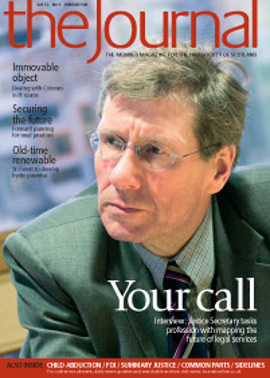"Charity begins at home" - but does it?

It was very helpful to see in the October edition of the Journal the article by Marieke Dwarshuis, Head of Charities at OSCR. The article did not however cover the point that OSCR registration is totally separate from HMRC tax exemption. The Tax Committee of the Society hopes the following comments are helpful.
As long ago as 1953, the House of Lords held that the tax definition of charity to be applied in Scotland was to be based on the English test used for non-tax purposes. The logic of that decision was that, at that time, Scotland did not have its own code of charitable regulation, and in particular a specific Scottish definition of “charity”. When what is now the Charities and Trustee Investment (Scotland) Act 2005 was progressing through Holyrood, many assumed that Scottish charities registered with the Office of the Scottish Charity Regulator (OSCR) would, as a result of that registration, be accorded tax exemption.
The Treasury has made it clear that it will take Westminster legislation to change the provision that the tax definition is the English definition. The Law Society of Scotland is in urgent and detailed discussions with both HMRC and OSCR on this subject, and has also made representations to the Treasury in its Budgetary Observations for 2008.
Practical advice
Meantime, the following practical points should be noted:
- Wording in a charitable trust or in the constitution of a charity which satisfies OSCR may not satisfy HMRC.
- Before documents are executed, approval should be sought from both OSCR and HMRC.
- If the charity is to operate in England, then the wording should be checked also with the Charity Commission.
- Once OSCR registration is achieved, a separate application should be made to HMRC for tax recognition.
- It is possible, and may in some cases be desirable, that a charity is registered only with OSCR or only with HMRC.
- Advisers of Scottish charities will wish to consider whether it is UK taxes (income tax/corporation tax, capital gains tax and Gift Aid reclaims) which are important, or devolved Scottish rates. Note that some local authority websites still refer to the Inland Revenue as the regulatory authority, which is no longer the case, and especially not on the question of rates.
- For existing charities subject to OSCR’s rolling review, any demands by OSCR for changes in constitutions or trust deeds should be considered carefully and, if otherwise acceptable, be checked also with HMRC – and possibly with the Charity Commission.
- Note that OSCR has some recommended wording which requires qualification both under the 2005 Act and for UK tax purposes; this double requirement may be too restrictive for many Scottish charities.
There is no universally desirable solution to this problem. If qualification as a Scottish charity were to bring automatic UK tax relief, the corollary could be that no Scottish organisation, even if it could qualify under the English test, could qualify for tax exemption unless registered with OSCR. There are organisations for which this development would be unwelcome.
In this issue
- More than just a new year
- Let youth have its say
- "You sort it out"
- A Colossus in the room
- ARTL cometh
- Letter from South Africa
- Lay justice reborn
- Power flows
- Year of the Commission
- Down to brass tacks
- Step up for Brussels office
- Small is doable
- Watching their diets
- 2008: let the fun commence
- Act going to plan
- Preferential treatment?
- Giving it the works
- Scottish Solicitors' Discipline Tribunal
- "Charity begins at home" - but does it?
- Website reviews
- Book reviews
- Freedom has its boundaries
- Pointing which way?
- There may be trouble ahead






